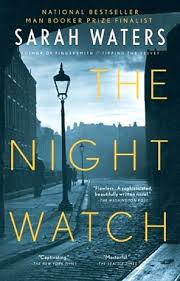 The Night Watch
The Night Watch
by Sarah Waters
Riverhead Books. 544 pages, $15 (paper)
IN HER LATEST NOVEL, The Night Watch, Man Booker Prize nominee Sarah Waters explores the experience of same-sex and other “deviant” forms of love in World War II-era London. Opening in 1947, the novel moves backward to 1944 and concludes in 1941. Although she often alludes to the past when recounting the events of 1947, Waters, in reversing the chronology of her narrative, requires her readers to understand the consequences of the past before fully comprehending their causes. Under these circumstances, it’s hard for judgment and blame to interfere with compassion for her characters’ pain.
The war might be safely over by 1947, but loss and anxiety still dominate the lives of Waters’ characters. Helen Giniver is miserable in her jealous and urgent love for her partner, Julia Standing, a successful novelist whom she fears losing to the glamorous journalist Ursula Waring. Julia’s coworker Vivien carries on unhappily with Reggie, a married man whose attentions she once longed for but now merely tolerates. Vivien’s brother, Duncan Pearce, spent time in prison during the War and now lives quietly with one of his former prison guards, Mr. Mundy. And Kay Langrish lives alone in a small flat above the offices of a Christian Science healer named Mr. Leonard.
Waters’ characters struggle to maintain love in the absence of social acceptance, and they must continually reinforce their own faith in its legitimacy. “Deviant” love—whether gay, lesbian, or adulterous—must survive not only the upheaval of war but also the denial in peacetime of the open expression of its joys. The success or failure of Waters’ characters is rooted, as the stories from 1944 and 1941 reveal, in longstanding fears of damage and loss that peacetime cannot begin to assuage. No treaty relieves them from an ongoing threat of attack—by others’ judgment or their own memories. The continuing blitz is subtle, destroying from within as easily as from without.
Returning to 1947 with the earlier two years in mind, one cannot help admiring Duncan’s timid first steps toward new love, or his forgiving Helen’s jealousy, or his coming to understand the significance of Kay’s reticence (relative to her usual exuberance). Nevertheless, it’s tempting either to pity or to wonder at these characters, like Kay and Duncan, who first appear as solitary, even lonely. Do they reject the company of others, content in their privacy, perhaps even contemptuous of those who might disturb it? Or could they be waiting for a long-hoped-for return, refusing to consider that solitude itself might be satisfying?
There is at least one more possibility. There is the solitude that can survive on little more than its devotion to a vision too strong to die but whose time to live freely has yet to come. It is only after reading about the events of 1944 and 1941 that we begin to comprehend the nature and degree of their mourning. Each bears a quiet, virtually unmentionable grief—Duncan in his loss of the young man he loves, Alec, and Kay in her loss of Helen—and they nourish and receive nourishment from a continuing faith in what they’ve lost.
As The Night Watch opens, Kay observes the procession of maimed and ailing people seeking the help of her landlord, Mr. Leonard. It is an appropriate beginning, as Leonard’s compassion in healing corresponds to the sympathy that Waters displays and urges, a sympathy without which no healing is complete. The tragedy she wishes to point out is that her characters (and those they represent) have yet to know a world in which they can seek such sympathy without shielding from view the very injuries they hope to heal.
____________________________________________________________________
Thomas March is a New York-based poet and critic whose recent work has appeared in The Believer, New Letters, and Shenandoah.





